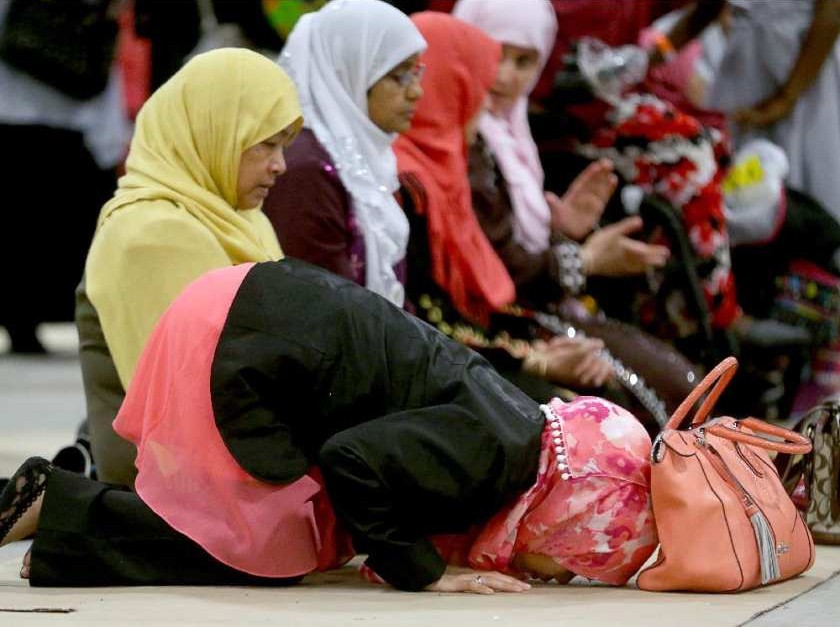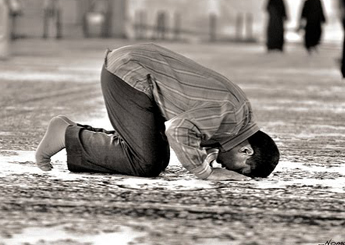
The Hadiths quoted in part one, which need no further illustration, are corroborated with numerous other Hadiths to the same effect, which indicates that by default women are allowed to frequent mosques in all lawful ways, at all times and for all prayers. However, the primary Hadith on the issue is that narrated by `Abdullah ibn `Umar, who said,
“One of the wives of `Umar (`Atikah bint Zayd) used to offer the Fajr and the `Isha’ prayers in congregation in the Mosque. She was asked, “Why do you come out for the prayer though you know that `Umar dislikes it, and it makes him jealous.”
She wondered, “Then, why does not he forbid me from doing that?”
The answer was, “What prevents him from that is the statement of Allah’s Messenger (peace and blessings be upon him), ‘Do not stop Allah’s female slaves (women) from going to Allah’s Mosques‘.”[1]
Ibn Hajar said: Indeed, when `Umar was stabbed, she was in the Mosque.[2]
It is stated in Al-Mu`jam Al-Kabir that:
Bilal ibn `Abdullah ibn `Umar narrated to me that one day his father said: Indeed, the Messenger of Allah (peace and blessings be upon him) said, “Do not deprive the female slaves of Allah of their share in the mosques” and then I said, “As for me, I shall forbid my household females, and whosoever wishes to let his women go out, let him do so.”
Thus, He (`Abdullah) turned to me and said, “May Allah curse you! May Allah curse you! May Allah curse you! You hear me say that the Messenger of Allah (peace and blessings be upon him) ordered that women are not disallowed, and you say such words.” Then, he, weeping, angrily departed.
Another narration reads, “He stretched his hand and slapped him.”[3]
The report narrated by At-Tirmidhy reads:
We were at Ibn `Umar’s, when he said, “The Messenger of Allah said, ‘Permit women to go to mosques at night.‘ His son said, ‘By Allah, we would not permit them to do so as they would do mischief.’ Ibn `Umar replied, ‘I say that the Messenger (peace and blessings be upon him) said such and such, and you say, ‘we would not allow them?’”
This Hadith is narrated in the related chapter, from Abu Hurayrah, Zaynab, the wife of `Abdullah ibn Mas`ud, and Zayd ibn Khalid, knowing that the Hadith narrated by Ibn `Umar is an authentic Hadith.[4]
Here, the reaction of `Abdullah ibn `Umar’s (may Allah be pleased with him), besides the quoted Hadith, indicate the conclusive prohibition of preventing women from frequenting mosques, as it is contrary to the Prophet’s (peace and blessings be upon him) command.
Hadith of `A’ishah: Precautionary measure for a temporary consideration
Despite the authenticity and soundness of these proofs, as well as their general nature, scholars preventing women from going to mosques introduce counter arguments which they deem absolute relating to the alleged temptation resulting from women’s visiting mosques. They report two Hadiths in support of their view:
– The first is the Hadith narrated by lady `A’ishah (may Allah be pleased with her) that reads, “If the Messenger of Allah (peace and blessings be upon him) had seen what new things the women have introduced (in their way of life) he would have definitely prevented them from going to the mosque, as the women of Banu Isra ‘il were prevented.“[5]
– The second Hadith is that narrated by `Abdullah ibn Suwayd Al-Ansary, from his paternal aunt, the wife of Abu Humayd As-Sa`idy, that she approached the Prophet (peace and blessings be upon him) and said, “O Messenger of Allah (peace and blessings be upon him), I like to pray with you!”
He (peace and blessings be upon him) replied,
“I already know that you like to pray with me, but your prayer in your room is better for you than your prayer in your hall and your prayer in your hall is better for you than your praying in your house, and your prayer in your house is better for you than your prayer in the mosque of your people, and your prayer in the mosque of your people is better for you than your prayer in my mosque.”
So she ordered that a prayer place be prepared for her in the furthest and darkest part of her house, and she used to pray there until she met Allah (i.e. died).”[6]
As for the Hadith narrated by of lady `A’ishah (may Allah be pleased with her), it does not involve her rejection of the default rule, but she rather acted according to the principle defined by Usul scholars as “Sad Adh-Dhara’i` [Blocking the means to evil]”, in response to an emergent case at her time. It seems that women then were negligent in observing legal rules of frequenting the Mosque.
So, she did not mean cancelling default permissibility or recommendation at all, or to “abrogate” it, in the sense that was perceived by some jurists. No luminary jurist in Madinah or any other town, or even over history, deemed that lady `A’ishah’s statement indicated changing the default ruling. When asked about preventing women from frequenting the Mosque, the Imam of Madinah, Imam Malik (whose time was just a few decades after lady `A’ishah), said, “(Women) should not be prevented from going out to the Mosques.”[7]
Ibn Hajar also said:
Some [scholars] held on to lady `A’ishah’s (may Allah be pleased with her) prevention of women’s frequenting the Mosque as absolute, though it is debatable. For, it does not entail a change in the ruling since she made it contingent on a non-existent condition, that is her supposition, as she said, “If he had seen … he would have prevented…” The counter argument, however, is that he (peace and blessings be upon him) neither saw it nor prevented that.
Besides, new things are introduced only by a few – not all – women, so if prevention becomes obligatory, it would apply only to the few who introduce such new things. It is also more entitling to consider the things that could cause temptation or mischief and avoid it, knowing that the Prophet (peace and blessings be upon him) forbade wearing perfume and adornment.[8]
Ibn Hazm also has a similar argument, as he said,
“Introducing new things is undoubtedly done by some women only, and it is impossible to prevent goodness for those who do not do such things because of those who commit them.[9]
Ibn Qudamah also said,
“The Prophet’s (peace and blessings be upon him) Sunnah is more entitled to be followed, and `A’ishah’s (may Allah be pleased with her) statement is limited only to those who introduce new things, knowing that going out is reprehensible for those who introduce new things.”[10]
Restriction should be lifted to obtain interest
In this age, restrictions should be lifted, ways should be facilitated and obstacles hindering women from frequenting the Mosque should be removed. Nowadays, women should be encouraged to go to the Mosque since this brings about the objectives behind existence of Mosques in Islam, which is remembering Allah, acquiring knowledge, acquainting with other Muslim women who frequent the Mosque and participating in public activities in a way that benefits the woman, her family, her community and her religion.
Sheikh `Abdul Halim Abu Shukkah (may Allah be merciful to him) commented on this Hadith to the same effect, as he said,
Had `A’ishah (may Allah be pleased with her) had seen what the women of our time have introduced, of frequenting places of entertainment and sporting and their susceptibility to vicious media invasion that controls and manipulates their minds and hearts, and that the only place they do not go to is the Mosque, would she have uttered her statement? Or she would have said, “Had the Messenger (peace and blessings be upon him) seen what women have done, he would have made it obligatory for them to frequent the Mosque!” She would have encouraged ladies to frequent mosques the same way she meant to deter them before, so that women would avoid the ambience of temptation and get used to decency.[11]
Hadith of Um Humayd: A specific context not a general rule
The context of the Hadith narrated by Um Humayd, which is not introduced in the narrations of Ibn Hibban and Ahmad, being the famous narrations, At-Tabarany, Al-Bayhaquy, Ibn Abu Shaybah, Ibn Abu `Asim and others with authentic additions, its context is an argument between the woman and her husband. The argument was due to Um Humayd’s punctual attendance of congregational prayer in the Prophet’s (peace and blessings be upon him) Mosque. In these narrations, Um Humayd said, “O Messenger of Allah, we like to pray with you but our husbands prevent us (from doing so).”[12]
This context resolves the conflict between the Hadiths narrated on this issue, especially the Hadiths with general rulings banning prevention of women from frequenting the Mosque, and this Hadith. Here, the Messenger of Allah (peace and blessings be upon him) meant to advise Um Humayd regarding solving her marital disagreement through complying with her husband’s request. So, he (peace and blessings be upon him) did not mean enacting a general legislation that obliges all Muslim women at all times and places. However, the Messenger’s (peace and blessings be upon him) intention in this case is not explicit; yet, it is the only possible interpretation that works out the conflict between texts, knowing that application of a text is more proper than neglecting it.
Weak hadiths used to deny women access to mosques
There is a number of weak Hadiths that are introduced as corroborating evidence by scholars advocating prevention of women from frequenting the Mosque. Yet, such weak narrations do not constitute a solid proof or countermand the numerous authentic Hadiths supporting the contrary opinion.
An example of these weak narrations is the hadith that the Prophet asked his daughter Fatimah about which is best for a woman. She answered, “That she should see no man and that no man should see her.” So, the Prophet (peace and blessings be upon him) hugged her and said, “(Good) offspring descending from one another.”[13]Besides its weak chain of narration (Isnad), the meaning of the Hadith contradicts with dozens of Hadiths referred to above about the female Companions (may Allah be pleased with them).
Rather, it contradicts explicit statements of the Quran, including the verse in which Almighty Allah says,
{Then whoever argues with you about it after [this] knowledge has come to you – say, ‘Come, let us call our sons and your sons, our women and your women, ourselves and yourselves, then supplicate earnestly [together] and invoke the curse of Allah upon the liars [among us].’} (Aal `Imran 3:61)
This verse explicitly involves Fatimah, daughter of the Prophet (peace and blessings be upon him), within the context of Mubahalah. Besides, in Ibn Kathir’s commentary on the verse, he mentioned the story of Najran’s delegation, stating,
“They refused to acknowledge that. Then, when dawn broke, the Prophet (peace and blessings be upon him) after informing them of the news, approached with Al-Hassan and Al-Hussayn wrapped in velvet cloth of his, and Fatimah walking behind him forMula`anah.[14]
There are also other Hadiths that involve Fatimah (may Allah be pleased with her) having normal interactions with men within the confines of the Shariah.
Mutual agreement and considering priorities is essential
So, the original ruling regarding preventing women from going out to the Mosque by a husband or a guardian, for instance, is that it is forbidden, based on the Prophet’s (peace and blessings be upon him) ordinance. Yet, we infer from the Hadiths of `Umar’s wife and of Um Humayd that both spouses should consult with each other and reach an agreement about this issue according to the different familial and social conditions.
For, it is improper that woman’s going out to the Mosque be at the expense of her duties towards her family, which are legally of a higher priority. However, her husband should cooperate with her in a manner that does not have negative bearings on his legally more important duties. So, the matter requires balance and moderation. Still, it is impermissible at all to prevent a woman from going out to the Mosque, since this prevention is explicitly forbidden by the Prophet (peace and blessings be upon him).
Summary
A Muslim woman should frequent the Mosque again, and it is impermissible to prevent her from doing so, either individually or collectively. Rather, there should be a suitable place for women in the Mosque, and they should be encouraged to go out to it so that they, like men, can bring about desired interests and objectives behind frequenting Allah’s places of worship, especially in the present age.
[1] Al-Bukhari, chapter on Prayer, 6/2; Ibn Hibban, 327/1, Al-Muwatta’, 197/1, Al-Bayhaquy, 199/3, with the addition, “And they should go out without wearing adornment or perfume”; Ibn Khuzaymah, 90/3, in a similar wording, Ibn Abu Shaybah, 156/2; with the addition, “And they should not go out expect when not wearing adornment or perfumes”; Al-Mu`jam Al-Awsat, 178/1; Ibn Abu Shaybah, 156/2; with the addition, “But they should not go into it unless when not wearing adornment or perfumes”, Ma`rifat As-Sunan Wal-Athar, 237/4; Ad-Darimy, through a sound chain of narration; Abu Dawud; and Ahmad on the authority of Abu Hurayrah (405/15).
[3] Al-Tabarany’s Al-Mu`jam Al-Kabir, 362/12 and 399/12.
[4] At-Tirmidhy, 709/1, Al-Bukhari, 305/1: Allow women to frequent the Masjids at night.
[5] Al-Bukhari, chapter on Prayer, 173/1; Muslim, chapter on Prayer, 328/1, and others.
[6] Ibn Hibban’s Sahih, 815/2, and Ibn Hajar’s Fat-h Al-Bary, 495/2, and he said: It is referenced by Ahmad, At-Tabarany, and the chain of narration referenced by Ahmad is good.
[7] Al-Mudawwanah Al-Kubra, 106/1.
[11] Tahrir Al-Mar’ah Fi `Asr Ar-Risalah [Liberating Woman in the Age of the (Divine) Mission], 36/1.
[12] Al-Bayhaquy, 190/3; At-Tabarany in Al-Mu`jam Al-Kabir, 148/25; and Al-Ahad Wal-Mathany, 150/6.
[13] Its chain of narration is weak, and Al-Hafizh Al-`Iraqi said upon referencing the Hadiths quoted in Ihya’ `Ulum Ad-Din, “reported by Al-Bazzar and Ad-Daraqutny under miscellaneous Hadith, from `Aly through a weak chain of narration.”
* Translated from the Arabic original by AboutIslam.net.






